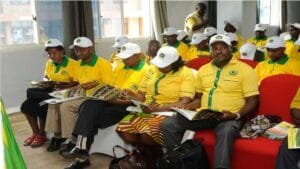Voices from the Classroom: What JSS Teachers Really Think About Autonomy

The ongoing discussion surrounding Junior Secondary Schools (JSS) teachers’ quest for autonomy from primary schools has gained significant prominence in educational dialogues. This emerging narrative has become crucial as educators seek to redefine their roles within the broader context of the educational framework. Understanding the perspectives of JSS teachers is integral to this discourse, as they are the frontline professionals who directly experience the implications of such structural changes. Their insights provide valuable context for policymakers, educational leaders, and stakeholders invested in the evolution of educational practices.
The importance of these educators’ viewpoints cannot be overstated. JSS teachers often face unique challenges that differ from those encountered in primary education, including distinct curricular demands, student developmental needs, and varying pedagogical approaches. As they advocate for greater autonomy, it is essential to recognize that these teachers aspire to create an environment conducive to fostering their students’ growth and learning. Moreover, their voices reveal a broader narrative about the need for specialized teaching frameworks that honor the complexities of secondary education.
This article aims to illuminate the collective experiences, concerns, and aspirations of JSS teachers regarding their quest for autonomy. By sharing these insights, we can better understand the implications of autonomy for educational quality, teacher satisfaction, and student outcomes. Ultimately, this exploration highlights the necessity to prioritize teachers’ perspectives when discussing changes to the educational structure, ensuring that reforms genuinely address the needs of those most affected. Through this dialogue, we can forge a path towards a more responsive and effective educational system that recognizes the distinct roles of JSS educators.
Background: The Call for Autonomy in JSS
The Junior Secondary School (JSS) system, which has increasingly been integrated with primary schools, presents a unique set of challenges and opportunities. The current organizational structure often blurs the lines between primary and secondary education, leading to issues related to curriculum alignment, resource allocation, and the overall identity of JSS educators. Teachers have found themselves navigating an environment where the demands of both educational stages converge, which can create inconsistencies in pedagogical approaches and expectations.
Resource allocation stands out as a fundamental concern within the JSS framework. As JSS institutions strive to provide a comprehensive educational experience, the existing budget constraints often limit the availability of essential materials and support services. This inadequacy may significantly impact the quality of education; thus, the push for autonomy is largely driven by the desire for more control over financial and material resources. By achieving greater independence, JSS teachers argue that they could tailor their resource needs more effectively to reflect the unique context of their students.
The differentiation in curricula between primary and secondary levels also underscores the call for autonomy. JSS has its distinct educational requirements that necessitate targeted instructional strategies. Teachers often advocate for a curriculum that aligns better with the cognitive and developmental stages of their students, diverging from the more generalized programs of primary education. This shift toward embracing autonomy is crucial for allowing educators to refine their teaching practices according to the specific needs of their students, thus enhancing engagement and learning outcomes.
Ultimately, a distinct professional identity for JSS teachers emerges as a vital component in the discourse surrounding autonomy. Capturing the voices of these educators is essential to understanding the real-life implications of proposed changes. This not only helps in recognizing the challenges faced but also emphasizes the benefits that could arise from a more autonomous operational framework.
Key Perspectives from JSS Teachers
Junior Secondary School (JSS) teachers often encounter a myriad of challenges that directly impact their workload and administrative tasks. Many educators express frustration regarding the dual administration structures present in their institutions. This duality can lead to confusion, as teachers find themselves navigating conflicting directives from different administrative entities. Such complexities often contribute to an increased workload, forcing educators to divert time and energy that could be better spent on lesson planning and student engagement.
Furthermore, JSS teachers advocate for professional respect and greater recognition as secondary educators. Their experiences in the classroom are rich and varied, warranting acknowledgment of their expertise and contributions to student development. Many educators feel that their unique professional identities are often undermined by a lack of institutional autonomy. Teachers believe that having more authority over their teaching methodologies and administrative dealings would bolster their confidence and lead to a more effective learning environment.
An additional layer to this discussion is the impact of autonomy on classroom management and the teacher-student relationship. Many educators argue that greater independence in their roles would allow them to tailor their teaching approaches to meet the diverse needs of their students more effectively. When teachers feel empowered to exercise their professional judgment, they report enhanced interactions with their students, fostering an atmosphere conducive to learning. Autonomy serves not only to respect the professional identity of teachers but also to cultivate a dynamic classroom environment where students thrive academically and socially.
In summary, the insights shared by JSS teachers underscore the complexity of their roles within the educational landscape. Understanding their perspectives on workload, respect, and autonomy is crucial for appreciating the multifaceted nature of teaching and the potential benefits of empowering educators in their professional practices.
Concerns and Reservations About Autonomy
While the concept of autonomy in Junior Secondary Schools (JSS) presents numerous opportunities for enhancing educational outcomes, many teachers express apprehensions regarding its implementation. One significant concern revolves around the sustainability of fully autonomous JSS schools. Educators often question whether these institutions can maintain necessary resources and financial support in a system that encourages independence from traditional state funding and oversight. The fear is that a lack of adequate financial investment could lead to disparities in resource availability, resulting in educational inequities between schools. Teachers worry that without stable resources, the quality of education might deteriorate, ultimately affecting student learning experiences.
Another notable reservation is the necessity for tailored training and professional development. With autonomy comes the need for educators to adapt to new teaching methodologies and administrative responsibilities. Teachers highlight the importance of targeted professional development workshops that focus on equipping them with the skills required to thrive in an autonomous environment. Many educators feel that without tailored training, they may struggle to meet the evolving demands of their roles, which could hinder the potential benefits of autonomy.
Additionally, transitioning to autonomy poses practical challenges, particularly in rural areas. In such regions, limited resources and infrastructure can complicate the implementation of autonomous practices. Teachers in remote locations often face issues such as inadequate access to technology, insufficient educational materials, and a lack of community support. These challenges can undermine the effectiveness of the autonomy model and lead to frustration among educators who wish to create a positive learning environment for their students. Thus, understanding and addressing these concerns is crucial for ensuring that the move towards autonomy is effective and beneficial for all stakeholders involved in the educational process.
Anticipated Benefits of Autonomy
The notion of autonomy in the classroom is increasingly being recognized as a pivotal factor in enhancing both teaching efficacy and student outcomes within Junior Secondary Schools (JSS). One of the most significant anticipated benefits of autonomy is that it allows teachers to exercise greater decision-making power regarding their instructional methods and curricular choices. This empowerment can lead to a more personalized teaching approach, enabling educators to tailor their strategies to meet the diverse needs of their students. By having the freedom to innovate and adapt their methods, teachers can create a more engaging and relevant learning environment that resonates with their students.
Moreover, autonomy is expected to improve teaching conditions by fostering an environment where a more focused curriculum can evolve. With increased autonomy, teachers can emphasize essential learning objectives that directly align with their students’ interests and challenges, thereby enriching the educational experience. Additionally, this independence provides educators the opportunity to advocate for and secure better resources, whether they are technological tools or instructional materials, ultimately enhancing the quality of education delivered in JSS settings.
Another crucial factor is the prospective effect of autonomy on student performance and engagement. When teachers have the capacity to tailor their lessons, students are likely to find the content more meaningful and interesting. This can lead to improved motivation and consequently better academic performance, as students become more actively involved in their learning processes. Through personalized instruction that addresses specific needs, teachers can foster a deeper understanding and retention of knowledge among students. In essence, the autonomy afforded to JSS teachers has the potential to create a more effective and responsive educational environment that ultimately benefits both educators and students alike.
Suggestions from Teachers for a Successful Transition
Transitioning to autonomy within Junior Secondary Schools (JSS) presents unique challenges and opportunities that necessitate careful planning and implementation. Teachers have expressed the importance of adopting a gradual, phased approach when introducing autonomous practices. Such a strategy allows educators to adapt to new roles and responsibilities progressively, minimizing disruption and fostering a smoother transition. This phased implementation can help mitigate feelings of overwhelm among teachers who may feel apprehensive about the increased independence.
Furthermore, ongoing support from the Teachers Service Commission (TSC) and the government is paramount in ensuring the successful transition to autonomy. Many teachers emphasize the need for adequate funding to support resource allocation, professional development, and classroom materials. Without these essentials, the challenges of autonomy become magnified, leading to potential setbacks in the educational quality provided to students. Teachers call for a dedicated investment in training programs that equip them with the skills and knowledge necessary for effective autonomous classroom management. Continuous professional development workshops can empower educators and connect them with peer networks, facilitating knowledge sharing best practices.
Another critical insight from teachers is the need for their involvement in policy-making processes. Engaging educators in discussions surrounding autonomy creates a sense of ownership over the changes being implemented. Teachers advocate for their voices to be included in decision-making frameworks, ensuring that policies reflect the realities and nuances of classroom experiences. By fostering a collaborative environment where educators can contribute ideas and recommendations, it becomes possible to develop policies that not only meet the broader educational goals but are also grounded in the specific needs of teachers and students alike.
Concluding Thoughts: What’s Next for JSS Autonomy?
The insights shared by Junior Secondary School (JSS) teachers reflect a nuanced understanding of the concept of autonomy within the educational landscape. Teachers express a mixture of hopes and concerns about the autonomy afforded to them, indicating that while they welcome greater freedom in decision-making, they also recognize the challenges that accompany this independence. Many teachers highlighted the importance of professional development and the need for adequate resources to effectively implement their ideas. They believe that with the right support, autonomy can lead to innovative practices that ultimately enhance student learning.
Furthermore, teachers voiced their apprehensions regarding the potential for autonomy to lead to inconsistency in curriculum implementation across different schools. The fear that some educators might not utilize their autonomy effectively underscores the need for clear guidelines and frameworks that maintain a certain standard while still allowing for creativity and innovation. Collaboration between educators at all levels emerges as a pivotal component in addressing these concerns, as teachers can share best practices and support one another in navigating the new terrain of autonomy.
As we look to the future, it becomes increasingly clear that teachers’ voices must play a central role in shaping effective education policies concerning JSS autonomy. Engaging with educators, policymakers, and school administrators can foster a collaborative environment that ensures any proposed changes genuinely enhance the JSS teaching experience. It is crucial that the discourse around autonomy continues, allowing for feedback and adaptation as the educational needs of our students evolve. By valuing the perspectives of those on the front lines, we can collectively work towards an educational framework that empowers educators while benefiting their students.






